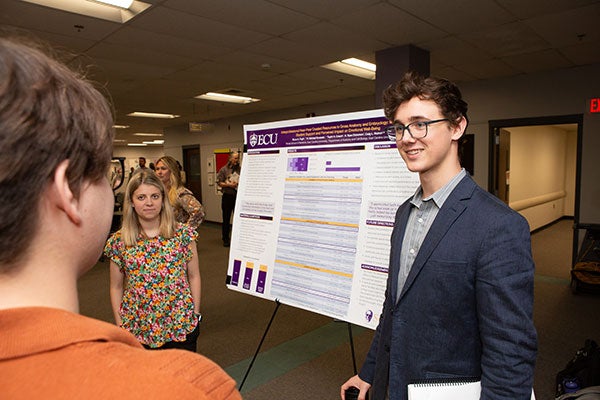ECU medical school marks 10th annual Medical Education Day
The Brody School of Medicine at East Carolina University held its 10th annual Medical Education Day April 25, celebrating scholarship and innovation in medical education.

Brody Med Ed Day Spring 2024 4.jpg: Brody School of Medicine students Taylor A. Creech and Michael Kovasala discuss their research at the Brody Medical Education Day. (Photo by Ben Abel)
The event included podium and poster presentations and the popular “Shark Tank” program, during which student presenters have five minutes to pitch their in-progress research to an expert panel and receive feedback on how best to move their projects forward.
Medical Education Day is traditionally a gathering of leaders, educators, students and other scholars that aims to provide a forum for sharing educational innovations in curriculum and teaching, enhances understanding of new approaches in medical education and strengthening the network of Brody community members interested in promoting educational excellence.
“Today marks another significant milestone in our ongoing commitment to advancing medical education and enhancing the quality of health care delivery in eastern North Carolina and beyond,” said Dr. Lisa Domico, teaching assistant professor in Brody toxicology, during opening remarks. “Today we will not only recognize the achievements of our educators, researchers and learners but also remember our dedication to the Brody mission. Our mission drives innovation, excellence and continuous improvement in medical education.”
The keynote speaker was Dr. Andrew Southerland, the Harrison Distinguished Teaching Professor of Neurology and executive vice chair of the Department of Neurology at the University of Virginia Health/UVA Stroke Center. Southerland is a 2006 Brody graduate and was a Brody Scholar. He is the past recipient of an early career award from the American Heart Association/American Stroke Association (AHA/ASA) National Clinical Research Program and has served as principal investigator for numerous clinical studies in the field of stroke and cerebrovascular disease.
Southerland’s address was titled, “Teaching Clinical Diagnostic Reasoning in the Age of AI – Domo Arigato, Mr. Roboto.”
Southerland discussed how artificial intelligence (AI) — which he also called “augmented intelligence” — can improve health care while the importance of a doctor-patient relationship remains at the forefront. He detailed some commercial AI products that contribute to medical care and how they can improve patient and provider experiences.
“I became interested in how we as educators need to consider artificial intelligence when it comes to medical education for the next generation,” Southerland said.
Southerland noted specific examples of products and programs in AI can help physicians better care for their patients. Providers can use AI and build upon its benefits using critical thinking and existing expertise.
“This is what we as humans can do well and how we can think about AI as a way to oversee what it’s doing,” he said.
Students earned accolades for their work during the event. Second-year medical students Jacob Richardson and Alissa Davis won the Shark with the Biggest Bite award for their presentation “Utilization of Artificial Intelligence Image Generation Tools to Augment Mnemonics for Medical Students: Proof of Concept.”
Alexandra Doherty, fourth-year medical student, won the Outstanding Podium Presentation award for her presentation, “A Delphi Consensus Study for the Development of a Specialty-Focused Ultrasound Curriculum for Fourth-Year Medical Students.”
The first-place poster award went to K. Ryan Dickerson, fourth-year medical student and Medical Education and Teaching Scholar, for his project “Near-Peer Created Full Length Practice Laboratory Practicals in Gross Anatomy and Embryology: An Effective Method of Learning in the Anatomical Sciences.”
The second-place poster award went Arden Vessie, fourth-year medical student for her project “Peer-Led Medical Spanish Education: Effects on Interprofessional Student Functional Language Self-Efficacy.”
The third-place poster award went to Michael Kovasala, first-year medical student and Taylor A. Creech, first-year medical student, for their project “Interprofessional Near-Peer-Created Resources in Gross Anatomy: Medical Student Support and Perceived Impact on Emotional Well-Being.”